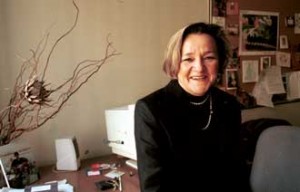
Building a hub for health and economic research
By Chris Chipello
McGill’s annual Health Challenge Think Tank conference has come a long way since marketing professor Laurette Dubé launched it five years ago. And the forum is poised to take another big step forward in the coming year – a step that promises to turn McGill into a year-round global hub for scientific and policy research on health and economic issues such as childhood obesity and food security.
This year’s conference, the third and final one to focus on childhood obesity, brought together leading international experts from fields including architecture, health, business, fitness, entertainment and education to share ideas for getting kids to spend more time moving and less time sitting in front of screens – unless what they’re watching gets them up and active.
The Think Tank, held Nov. 5-7 at the Centre Mont-Royal, was followed by the workshop “Green Revolution 2.5” on food security and safety issues, sponsored by the Bill & Melinda Gates Foundation.
Dubé, whom Principal Heather Munroe-Blum aptly called a “force of nature” in her remarks closing the Think Tank, is planning to build on all this groundwork by launching next year a global knowledge and education initiative called the McGill World Platform for Health and Economic Convergence. The platform would include a virtual think tank/Web portal that would keep researchers, policy experts and community groups linked year-round.
To tackle problems as complex as childhood obesity, global food crises and the neuroscience behind consumer choice, “the everyday economic machine has to be revisited,” Dubé said. “McGill will be absolutely unique” in helping businesses and communities “address the interface of health and economics.”
The plan is to focus on certain core specialties. The first will be childhood obesity. In this field, “we’ve accumulated (expertise) as good as it gets in policy, business and social innovation,” Dubé said.
Eventually, the platform would also cover broad agricultural and food issues that involve safety, security and the link between overconsumption and chronic diseases.
The Think Tank began in 2003 as a way to explore challenges related to consumer behaviour and decision-making, Dubé’s long-time area of research.
The 2005 conference highlighted research showing that people are hard-wired to prefer sweet and fatty foods. (Those qualities were highly useful when food was hard to come by – less so in the age of supersized french fries and soft drinks.) At the same time, the session also examined how business and civil
society can pursue innovations that help make healthy foods “the most natural
option.”
In focusing on the “energy-out” side of the obesity equation, this year’s Think Tank tackled architecture, urban-planning and transportation topics. McGill School of Architecture Prof. Avi Friedman, widely known for his innovative designs of affordable homes, served as guest co-chair.
The Health Challenge series has benefited from McGill’s strength in health sciences. It also illustrates the Desautels Faculty of Management’s emphasis on societal issues, Dubé said. “Our business school worldwide is one of the few that has always made social issues part of its strategic agenda.”
Going forward with the new platform, Dubé said, “the idea is to build upon what we’ve started, and also on all the gems at McGill.”
